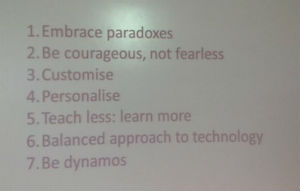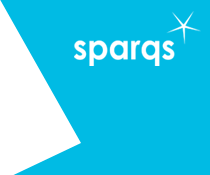We are delighted to launch a new series of interviews with student engagement practitioners, starting with Stewart Hay MBE. Stewart was deputy head at Anderson High School in Lerwick, and is the founder of The Global Classroom, an international partnership that allows staff and students at secondary schools across the world to share experiences on learning and teaching. The network has an annual conference which in 2015 will be hosted in Shetland.
Stewart recently spoke at Shetland College’s first student rep conference, an event in which we participated. You can read our short 'Storify' of the day here. Inspired by some of the points he raised in his address at the conference, we approached him to further explore his perspectives on learning and teaching, what we can learn from the schools sector, and the vital role of course reps.
Scotland’s university and college sectors often claim, with much justification, to be global pioneers in student engagement, because of the way we put students at the heart of all decisions from strategic policy making to shaping the curriculum in the classroom. Your background, however, is in the secondary school sector, including the innovative collaboration that is The Global Classroom. Do you think universities and colleges can learn from what is happening in schools, both here in Scotland and abroad?
Engaging with and ensuring an active participation of the student voice is integral to the work done in developing the network of schools known as The Global Classroom. From the outset of planning in the early 1990s it was very clear that students live in the 'now world' in terms of technology and communication and teachers live in the 'nearly now world' - always catching up in use, application and development of IT. In recognition of this the GC website was created and established by a Czech student and thereafter run by a small team of international students with a few staff from the partnership.
A Czech and Japanese student worked on the submission to the then Scottish Executive in 2002 for funds from the Future Learning and Teaching programme to install video conferencing facilities in Anderson High School. The bid was successful and students from the network of schools worked collaboratively with staff in setting up networked learning in a variety of courses.
In both these cases applying the then nascent networking by students was central to the role they played in working with a few teachers to establish learning across a network of schools.
A couple of years after the network was established – in 1999 – with the help of Prof John MacBeath, Emeritus Prof of Leadership Education at the University of Cambridge, an international student research programme was established involving the nine schools of The Global Classroom and known as The Learning School. It builds on the principle of students as reflective learners and on that of networked learning. It involves a post-high school student from each of the schools in the partnership spending an academic year visiting each school for 4-5 weeks and while hosted in the school researching a key aspect of learning. Led by two graduate co-ordinators the group produce an annual publication of findings. In 2010-2011 the group fed into the Donaldson review of The Future of Teaching and Learning in Scotland.
These examples perhaps highlight some significant ways of Student Voice being central to the aim of global learning within the Global Classroom network of schools.
Presumably the skills and capabilities of the students involved in these projects were of huge importance – for instance in writing submissions, undertaking research, networking collaboratively and so on. How easy was it to identify and develop those skills in potential participants?
The Learning School programme grew from the aim to engage students with learning to learn, and learning to share perspectives and insights of learning and living. In the early stages we relied on each of the schools in the network inviting applications from interested senior students and each school involving interested students in reflective learning.
Over time we devised an application procedure which asked students to write or submit digital examples like short YouTube clips of learning to learn and what they saw as the power and potential of learning globally.
Applicants had to raise the cost of travel – in the region of £1500 – and in addition personal spending. This was seen as initiative testing and certainly highlighted some fascinating fundraising.
Prof John MacBeath was a great help throughout and in 2003 he and a Japanese Professor who worked with us, Prof Hidenori Sugimine, wrote a book on the programme.
Given that, what lessons are there for the required skills for reps in the college and university sector engaging in this sort of work? For instance, when you spoke at Shetland College you gave a list of seven attributes or approaches reps should have. Are there one or two, briefly, that you’d like to especially highlight?

I think the seven points shared with the student reps at Shetland College all have merits. I do think however that learning is nothing if not personal. It is important for students to learn to learn - how does the process work and embed and make sense for each person? How does the deep learning – that part way beneath the iceberg – become part of a person's personal wisdom? So “personalise” is for me very important.
Also important is developing a sharp clear and balanced approach to technology. Blanket bans on mobile technology seem to me not a good idea. Why switch off the libraries of the world when they can be of immense value to the process of knowing? As online courses multiply by the day and key aspects of undergraduate study merge into the senior phase of learning, it is vital for student reps to be part of the development of new ways of embracing technology as key to information gathering from which knowledge can be gained and ultimately from which wisdom and insight follows.
Following from this I think “Teach Less: Learn More” has lots to commend it. As student reps join teachers/lecturers in learning teams to devise courses, programmes and materials, the importance of learning will come to be seen as vital to this partnership.
The importance of student reps being reflective learners with a sharp mind to the future will be vital - thinking differently helps organisations, communities and states be different, and that is vital for the future. There is no future in schools, colleges and universities all offering variations of the same.
To engage deeply in all these areas – the role of technology, the nature of learning, the shift from teaching to learning – suggests a huge and vital role for course reps. For instance, in your talk at Shetland College you described that role as like “mediators” – between the possibly competing perspectives of fellow students, and between students and staff. So finally, what can teaching staff do to make the most of these “mediator” course reps and work with them successfully in partnership?
Student reps are the eyes, ears and sensitivities of their fellow learners and teachers. This will involve a lot of listening to and discussing and engaging with fellow learners and teachers. It will also require time to reflect on the issues and concerns and indeed suggestions raised. It may well then require some mediation between particular strongly held ideas and views and opinions.
I think student reps can be key figures in learning teams - students and teachers and indeed perhaps members from the wider community who may have particular specialist skills or interests. Developing some learning programmes and some parts of the curriculum can be done well by the co-operation and collaboration of student reps and teachers and, where appropriate, specialists. Mediation could be very important in this way of learning and teaching.
There will also be a mediating role for student reps perhaps in relation to online learning. Initiating discussion about some of the issues raised in these and more traditional courses can be an important and productive role for student representatives.
Thanks to Stewart Hay for being our first interviewee. To suggest a future subject for interview, please contact us.
This interview is the first in what will be a series of occasional interviews on our website with student engagement practitioners – both staff and students, and from within Scotland’s university and college sector and beyond. The interviews aim to capture the different perspectives that people have on student engagement in the quality of learning.


